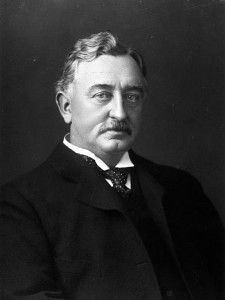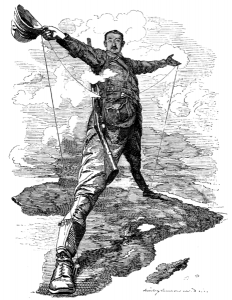Introduction

Born in 1853 in Hertfordshire, England, Cecil Rhodes was the fifth son of Reverend Francis William Rhodes. Although Rhodes debated whether to follow in his father’s footsteps as a vicar or his brothers’ paths in the army, he knew neither choice suited him. Cecil was quite sick as an adolescent, so much so that one week before his seventeenth birthday and with the expectation that Rhodes’ overworked heart could wear out within six months time, the physician recommended the Victorian panacea — a long sea journey — for his recovery (Roberts 7). Rhodes’ parents sent him to join an older brother in South Africa. The exoticism of the new continent thrilled Rhodes, providing entirely new territories for his exploration. His dreams of moving into new territories grew after he joined his brother in cotton farming in Natal. Rhodes began to develop his belief in the the strength and mission of British colonialism in South Africa.
Reports of successful gold and diamond mines enticed the Rhodes brothers to Kimberly where Rhodes built his fortune by investing in mining, railroads, and lucrative schemes. While he amassed a fortune in Kimberley’s diamond trading, he devoted part of each year to continuing his education. In 1873, he began traveling back and forth between South Africa and Oxford University’s Oriel College for eight years. Health problems forced him to cut his post-graduate studies short in 1873, and he returned to the mines amidst their flooding. He earned a fortune by pumping out others’ mines, then he devised a plan to monopolize the diamond markets in order to retain the jewel’s value. In 1888 he founded the De Beers diamond mines. He became one of the wealthiest men in Africa, and political success followed financial success. In the 1890s he served as Prime Minister of the Cape as he worked to expand Britain’s land holdings throughout Africa. Rhodes was one of the most significant agents in the treaties and negotiations that dispossessed the Ndebele and Shona peoples. In 1895, the settlers renamed the land Rhodesia, after Rhodes. In 1902, Rhodes’ heart condition led to his early death.
Rhodes’ Vision

At the end of the nineteenth century, Rhodes fixated on a vision of the map of Africa, which would be colored exclusively in red, which represented British control. In addition to founding the company that remains the world’s largest commercial diamond producer, De Beers Consolidated Mines, he also invested in railroads. Rhodes considered the transportation industry a more stable business than diamonds, and he envisioned a line that stretched from the Cape of South Africa to Cairo, Egypt. He amassed great wealth through entrepreneurial endeavors. However, Rhodes’ desire to build a personal empire fell a distant second to his desire to increase the British throne’s colonization of Africa. In Rhodes, Antony Thomas included Rhodes’ explanation of his British idealism:
It often strikes a man to inquire what is the chief good in life; to one the thought comes that it is a happy marriage, to another great wealth, and as each seizes on the idea, for that he more or less works for the rest of his existence. To myself, thinking over the same question, the wish came to me to render myself useful to my country. (113)
Building Empire: Rhodes’ “Confession of Faith”
Rhodes contended that sharing British imperialist ideals would benefit all humans. Scholars have labeled this as his “Confession of Faith”:
I contend that we are the finest race in the world, and that the more of the world we inhabit the better it is for the human race. I contend that every acre added to our territory means the birth of more of the English race who otherwise would not be brought into existence. Added to this, the absorption of the greater portion of the world under our rule simply means the end of all wars. The objects one should work for are first the furtherance of the British Empire, the bringing of the whole uncivilized world under British rule, the recovery of the United States, the making of the Anglo-Saxon race but one Empire. (Gross 61)
Accessing The Gateway to the North
While Rhodes served as Prime Minister of South Africa in the 1890s, Germany and Portugal increased their hold on land in Northern and Western Africa. Rhodes feared Britain could lose access to the rest of the continent. Therefore, he planned to obtain a gateway through Africa’s central portion.
One year before he and his associates obtained a royal charter to form the British South Africa Company in 1889, Rhodes found an access point for this gateway. It included a stretch of fertile land, which lined the border of Bechuanaland near the Transvaal. Ethnic groups had fought over this area for years. They were prepared to fight against British troops to prevent imperialist domination of their portion of Africa’s geography.
King Lobengula, the king of the Ndebele people granted Rhodes and his associates access to minerals in Bechuanaland, the land inhabited by Lobengula’s tribe. However, the British South Africa Company’s charter from the Queen authorized them to settle and administer this area, which was located immediately to the north of the South African Republic and west of the Portuguese territories. King Lobengula later revoked the company’s access to minerals and denied access to the land. He wrote to Queen Victoria in 1889:
The white people are troubling much about gold. If you have heard that I have given my whole country to Rhodes, it is not my words. I have not done so, Rhodes wants to take my country by strength. (O’Meara 27)
Rhodes’ Legacy
Rhodes legacy as an empire builder includes more than the formation of Rhodesia. He built monuments and established game reserves in some of the most beautiful settings within South Africa and Rhodesia in accordance with the colonial ideals of preserving the territories’ natural treasures. Some scholars contend that his ideas to civilize the natives in Africa’s interior fertilized the seeds of apartheid in South Africa and Rhodesia. Roberts wrote in Cecil Rhodes:
Throughout his life he proclaimed his faith in the superiority of the Anglo-Saxon race: a faith that was to lead to his being likened to Adolf Hitler. Nor did he make any secret of his own role in furthering British interests (1).
Rhodes’ gifts to the United Kingdom’s Oxford College remain his best known legacy, the Rhodes Scholarship. Although the Rhodes Scholarship program remains one of the most prestigious awards for international study, it is crucial to understand that Rhodes was a fervent imperialist and that the founding of the scholarship was intended to support the expansion of British (white) imperialism.
See also: Zimbabwe’s Struggle for Liberation, Essentialism, Nationalism, and Geography and Empire
Works Consulted
- Akers, Mary. Encyclopaedia Rhodesia. Salisbury, Rhodesia: The College Press, 1973.
- Afigbo, A.E., A. E. Ayandele, R. J. Gavin, J. D. Omer-Cooper, and R.Palmer. The Making of Modern Africa, v. 1. Essex: Longman Group, 1986.
- Blake, Robert. A History of Rhodesia. New York: Alfred A. Knopf, Inc., 1977.
- Fage, J.D. A History of Africa, 3rd ed. New York: Rutledge, 1997.
- Gross, Felix. Rhodes of Africa. New York: Frederick A. Praeger, 1957.
- Hole, Hugh Marshall. The Making of Rhodesia. London:Frank Cass and Company Ltd., 1967.
- Keppel-Jones, Arthur. Rhodes and Rhodesia The White Conquest of Zimbabwe 1884-1902. Montreal: McGill-Queen’s University Press, 1983.
- Rotberg, Robert I. The Founder Cecil Rhodes and the Pursuit of Power. New York: Oxford University Press, 1988.
- Thomas, Anthony. Rhodes. London: BBC Books, 1996.
- Walker, Eric A. A History of Southern Africa. London: Longmans, Green and Co. Ltd, 1957.
Author: N/A Spring 1999
Last edited: July 2017